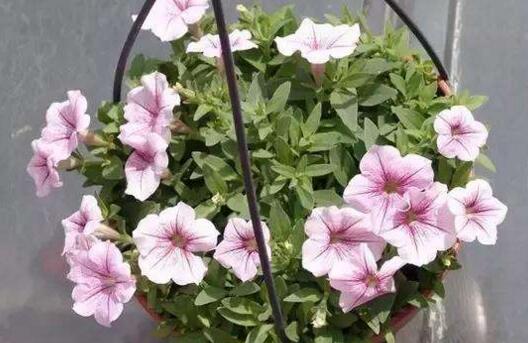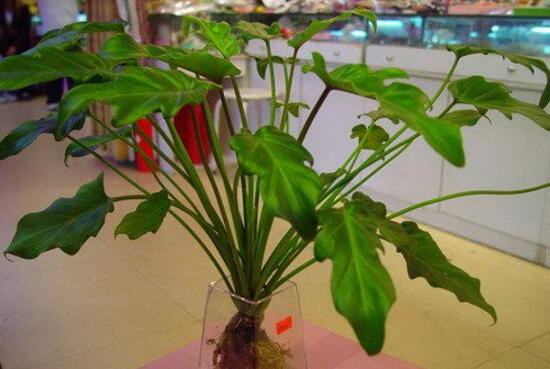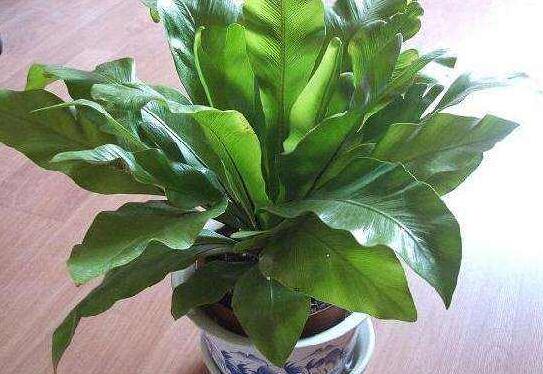How to reproduce Petunia, when to sow Petunia / Petunia cutting method Diagram
The reproduction of petunia requires some skills, for example, it needs to ensure that the temperature is 13-18 degrees, and the substrate is slightly acidic soil, and so on, only all aspects are correct in order to ensure a high success rate, so how to reproduce petunia? Let's take a look at the breeding methods of petunia.
How to reproduce Petunia

The commonly used breeding methods of petunia are sowing and cutting, in which sowing can be divided into autumn sowing and spring sowing, while cutting is commonly used to repeat petunia and big flower varieties, so when will petunia sow? What is the cutting method of petunia? Let's introduce it in detail.
Seed propagation of petunia
When will Petunia be sown
Sowing can choose spring sowing or autumn sowing, in which spring sowing is in late April, while autumn sowing is in October-November, sowing should avoid the rainy season, so it is best to carry out indoor sowing to prevent Rain Water from causing rotten roots.
2. Sowing method
Before sowing, install the substrate in the flowerpot, which is generally made of garden soil, rotten leaf soil, fine sand and so on, and then sow the selected good seeds in the substrate without covering the soil, then spray the seeds and water the soil thoroughly.
Keep the temperature at 22-24 degrees, generally 4-7 days can emerge, if the temperature is controlled at about 20 degrees, the emergence time is about 10 days, when the first pair of true leaves, you can apply some nitrogen fertilizer, wait until the growth of 2-3 pairs of true leaves, it is necessary to reduce the temperature to 18-20 degrees, and then apply compound fertilizer, and then transplant and normal maintenance.
Diagram of cutting method of Petunia
1. Cutting time
The temperature after cutting is the key to its success. In order to facilitate maintenance and management, the time is generally chosen in May-June or August-September, which is easier to control the temperature, and is the most successful time of the year.
2. Cutting methods
1. How to reproduce Petunia when choosing cuttings? Select a robust branch that is not disturbed by diseases and insect pests, cut it from the position of the node base, and then trim it to a length of about 10 cm to ensure that the cut is flat and has 2-3 leaves, then soak it in potassium permanganate solution and disinfect it.
2. Cut cuttings into the soil with a depth of about 1.5 cm, then pour water through and put them in a semi-shady environment to keep the soil moist and the temperature is about 20 degrees Celsius. To avoid cutting infection and rot caused by too wet soil, it can take root after 2-3 weeks.
Transplantation and colonization of Petunia
1. Transplant. When transplanting, the temperature should be kept at about 27 degrees during the day and above 15 degrees at night. The soil should be fertile and loose, but not too much nutrients, otherwise it is easy to grow steeply. Then give enough light to avoid injury to the plant during transplanting, so it is necessary to carry intact soil balls on the roots when transplanting.
2. Planting. When the seedlings grow to a height of 15 cm, you can replace a slightly larger basin, and the best time to plant is about 70 days before flowering. After planting, you need reasonable fertilization and watering, and then ensure good soil drainage. After patient maintenance for a period of time, you can see beautiful petunia flowers in full bloom.
Petunia photo Daquan Petunia cutting method (illustration)
Petunia is a kind of plant introduced from abroad in our country, which is widely cultivated in our country at present. Because of its high ornamental value, it is deeply loved by consumers. People like to plant it, but when planting, they need to have a certain understanding of its breeding technology, so as to ensure its growth.
Cutting method of Petunia (graphic)
Cutting substrate. Maintain water permeability with a mixture of cultivated soil, rotten leaf soil and sandy soil sold on the market, plus a little perlite.
Cutting flowerpots. Generally choose the flowerpot is not too large, 15-20 caliber flowerpot can.
Cuttings. Generally do not choose old branches, it is not easy to live. Choose sturdy and pest-free branches, cut off the stem near the bottom of the node, about 10 cm, the wound to dry, remove all the buds and fruits on the cuttings, and remove 2 / 3 leaves.
Cutting temperature. The best soil temperature is 18-20 ℃, pay attention to moisturizing. Pour the matrix into the flowerpot and make a hole with scissors, chopsticks or bamboo sticks. The hole is 2-3 cm deep and 6 cm apart.
Insert the cuttings into a small hole, and then compact the surrounding soil.
When it's all done, pour enough water and cover it with cling film. Indoor cuttings put the cuttings in a place where the sun scatters light. Remember not to lift the cling film.
The cuttings can take root in 15-20 days without wilting and decay, which indicates that the cuttings have survived. It can be transplanted into pot in 30 days. Petunia recovers slowly after transplantation, so attention should be paid to carrying as much soil as possible when potting.
Selection of cutting time of Petunia and its reasons
Petunia cutting is easy to survive, generally choose the time of cutting is spring and autumn, at this time the survival rate of cutting is high. The suitable temperature and dry air in spring and autumn can achieve the effect of constant temperature and more water through human factors. At this time, cutting can increase the survival rate through artificial efforts.
Growth habits of Petunia
1. Sunshine and temperature. Petunia, native to South America, is a long sunshine plant and likes warm environment, but it has strong adaptability to temperature. The suitable temperature for growth is 13-18 ℃, and the range of temperature difference is about-2 ℃-35 ℃. But if the temperature is lower than 4 ℃, the plant will stop growing.
2. Water and soil. Petunia needs sufficient water supply in the whole growth process, especially in the hot summer, the basin soil should be kept moist sooner or later. In the outdoor environment, we should beware of the harm of rain and waterlogging, especially in the rainy season, we should pay more attention to the control of water, excess water will lead to excessive growth of stems and leaves, long-term stagnant water will even make the roots rot, the most serious wilting and death of the whole plant. In soil selection, petunia should give priority to the use of slightly acidic sandy soil with fertile, loose and good drainage.
Petunia maintenance
1. After planting, after reasonable maintenance, petunia seedlings will grow day by day and eventually become a beautiful bouquet! The perfect bouquet is made by pruning, topping and picking the heart of the petunia. Nitrogen fertilizer should be used in the early stage, and phosphate fertilizer can be used in the later stage to make the flowers and seedlings stronger and bloom better. Petunia maintenance in summer should pay attention to: spray more water when the temperature is too high to maintain soil moisture. In winter, it is necessary to ensure that the petunia receives enough sunlight (the temperature is more than 5 ℃). The petunia has the ability to resist low temperature.
2, less watering, it is recommended to water at noon when the sun is sufficient, the amount of water is not too much, let the seedlings and flowers drink enough! The methods and precautions of Petunia florescence Management Petunia usually blossoms in early March when it turns warm. If the initial flower pattern is not good-looking, it can be cut off. When the flower head appears a lot at once, you can keep it and wait for it to blossom. Scientific fertilization should also be carried out during flowering, and it is still recommended that fertilization be carried out in a cycle of 10-12 days. Plenty of sunlight can greatly improve the quantity and quality of flowering. if there is a lack of sunlight, it is prone to malnutrition-the leaves turn yellow and soft, and the flowers are dim and small.
The cutting method of petunia is relatively simple, preparation needs to be done before cutting, and all tools need to be disinfected. Then choose an appropriate time for cutting. After cutting, we also need to strengthen its maintenance and management, so that it can survive well.
When does the petunia top the petunia to pick the heart (diagram)
Topping and coring are very effective methods to promote the normal growth of plants in the process of plant planting. Topping and coring can remove the top advantage of plants and avoid wasting the nutrients of the whole plant. Concentrate all the nutrients to the most valuable places.
When will the petunia hit the top?
Topping is the most important step in the process of planting dwarf cattle, and many beginners end up blooming in an ugly shape because they don't pay attention to topping. The upright varieties should hit the top more ruthlessly, the first topping generally retain 4-6 leaves, hanging varieties retain 6-8 leaves, and the treatment of lateral branches is the same. In the meantime, pay attention to its branching condition, generally when the weather is relatively hot, the branching is poor, flowering instead of branching. The branching ability is better in winter, and it can basically send out new branches from the axils of leaves after topping.
Petunia heart-picking method
1. The function of picking the heart
If the heart is not plucked in time, the flower branches of petunia are like the picture above, and the plant can only produce a few flowers. The branches will also be very few, and it will be difficult to reach the burst basin.
2. When will you pick the heart?
It is best to wait for the petunia to grow 5-6 leaves, cut off the top with flowers, and leave 4 leaves. When the branch grows 5 leaves, it can be pruned again, "cut 3 and leave 2". And so on, cut several more times (depending on the situation, 2-3 times will be able to achieve the effect of the bouquet). Note that during daily care, one should clean up rotten flowers and leaves.
3. How to pick the heart
Flower friends in the heart-picking operation, the tools to pick flowers can use scissors, you can also directly pinch off the top with your hands, rest assured to try. In addition, if you think the cut branches are wasteful, petunia can be cut, directly cut the branches, remove the leaves and leave the top core, and the low end can be sharpened and planted in the soil.
How does Petunia survive the Winter
1. Watering
First of all, we should follow the principle of "no dry, no watering, watering thoroughly". The purpose of this principle is to prevent the occurrence of rotten roots, fallen leaves or young branches caused by excessive water absorption, which will lead to the differentiation of flower buds and the weakening of cold resistance in the later stage.
Secondly, for the water used to water flowers in winter, there is also a requirement that it should be used after insolation, in order to keep the water temperature close to room temperature.
The best watering time is around noon. If you choose to water in the evening, it will be easy to cause frost damage to the roots of flowers because of the cold temperature.
2. Fertilization
Fertilization should be based on the specific growth of petunia, appropriate application of nitrogen fertilizer.
3. Other aspects
As the air is relatively dry in winter, petunia should be sprayed and washed indoors with water close to room temperature, in order to keep the leaf clean and promote normal photosynthesis, but pay attention to spraying water to the leaves should not increase the moisture in the basin soil. avoid rotting roots.
Winter is also a season in which aphids, shell insects, whitefly and other pests are prone to occur, so prevention and control work must be done at all times. After the emergence of aphids, try not to spray with permethrin, so as not to cause drug damage, which is disadvantageous to the growth of petunia.
How did Petunia explode?
1. Temperature: it is necessary to ensure that the temperature is within the range most suitable for it in order to provide the basis for its explosion. For this kind of plant, the most suitable range is 13 to 18 degrees. Once the temperature is relatively low, do not leave it outside, but move it indoors for maintenance.
2. Lighting: in order to achieve the effect of exploding the basin, the condition of sufficient light should be guaranteed. Especially when the growth rate is fast, this stage is the critical period to burst the basin. During this period, except for the strong light, there is no need for shade.
3. Moisture: it grows faster in summer, so there is more moisture. It is best to water twice in the morning and in the evening. However, special care should be taken not to accumulate water. In addition, don't let it get too much Rain Water.
4. Soil quality: first of all, there are two requirements: looseness and fertility. In addition, considering that it can not be waterlogged, it is required to drain well. Therefore, we had better choose sandy loam.
Petunia topping and heart picking are described in detail in French. In short, if you want to grow a good petunia, you still need to master a lot of things, but if you really want to plant, pay heat will work with you to solve the problems in the planting process.
- Prev

How to propagate Brazilian wood, the diagram of propagation method / cutting survival rate is 100%.
As a kind of foliage plant introduced from abroad, Brazilian wood can be said to be loved by flower friends in recent years. It is not only good-looking, but also has amazing effect of purifying air and beautifying home, so it has been propagated in large numbers. The reproduction methods of different plants are different, so how does Brazil wood reproduce?
- Next

How to reproduce bird's nest fern, the method of reproduction / ramet or spore reproduction of bird's nest fern
Bird's nest fern is also known as mountain perennial. Because of its strong shade tolerance and large and glossy leaves, it is a very popular foliage plant. Many flower friends evaluate it as one of the best plants to raise, so is it difficult to reproduce? How do bird nest ferns reproduce? Let's take a look at the breeding methods of bird's nest fern.
Related
- Fuxing push coffee new agricultural production and marketing class: lack of small-scale processing plants
- Jujube rice field leisure farm deep ploughing Yilan for five years to create a space for organic food and play
- Nongyu Farm-A trial of organic papaya for brave women with advanced technology
- Four points for attention in the prevention and control of diseases and insect pests of edible fungi
- How to add nutrient solution to Edible Fungi
- Is there any good way to control edible fungus mites?
- Open Inoculation Technology of Edible Fungi
- Is there any clever way to use fertilizer for edible fungus in winter?
- What agents are used to kill the pathogens of edible fungi in the mushroom shed?
- Rapid drying of Edible Fungi

